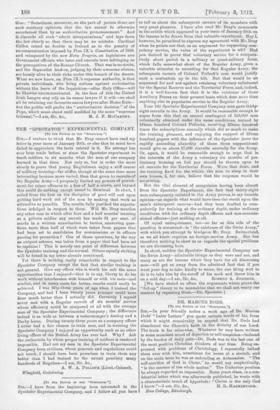[TO MI EDITOR, Or Tea "SPROTATOR. H ]
have front the beginning been interested in the Spectator Experimental Company, and I follow all you have to tell us about the subsequent careers of its members with very great pleasure. I have also read Mr. Bray's comments in the article which appeared in your issue of January 20th on the lessons to be drawn frern that valuable experiment. May I, however, be permitted to express my agreement with Mr. Bray when he points out that, as an argument for supporting com- pulsory service, the value of the experiment is nil P Had you desired to prove that voluntary service for a compara- tively short period in a military or quasi-military force, which falls somewhat short of the Regular Army, gives a valuable stimulus to recruiting for that Regular Army, the subsequent careers of Colonel Pollock's men would justify such a contention up to the hilt. But that would be an argument for and not against retaining voluntary enlistment for the Special Reserve and the Territorial Force, and, indeed, it is a well-known fact that it is the existence of those Auxiliary Forces on their present basis which does more than anything else to popularize service in the Regular Army.
Your 102 Spectator Experimental Company men gave thirty- eight recruits to the Army. It would be reasonable enough to argue from this that an annual contingent of 150,000 men voluntarily obtained under the same conditions, trained by fifteen hundred Colonel Pollocks, receiving fifteen hundred times the subscriptions annually which did so much to make the training pleasant, and enjoying the support of fifteen hundred papers with the influence of the Spectator (note the rapidly ascending absurdity of these three suppositions) would give us about 57,000 recruits annually for the Army. Or, again, it would be reasonable enough to urge that in the interests of the Army a voluntary six months of pre- liminary training on full pay should be thrown open to all recruits for the Territorial Force. Were that done, and the training fixed for the winter, the men to sleep in their own homes, I, for one, believe that the response would be surprising.
But the vital element of compulsion having been absent from the Spectator Experiment, the fact that thirty-eight men subsequently enlisted in the Army proves, in my humble opinion—as regards what would have been the result upon the men's subsequent careers—had they been drafted in com- pulsorily for training at the ordinary depot, under ordinary conditions with the ordinary depot officers and non-commis- sioned officers—just nothing at all.
Of equal unimportance, too—so far as this side of the question is concerned—is " the existence of the Swiss Army," with which you attempt to bludgeon Mr. Bray. Switzerland, as we all know, requires no foreign-service Army. She has therefore nothing to show us as regards the special problems we are discussing here.
In short, neither the Spectator Experimental Company nor the Swiss Army—admirable things as they were and are, and
many as are the lessons which they have for all discerning men—will get us away from the admitted fact that if you want your dog to take kindly to water, the one thing NOT to do is to take him by the scruff of his neck and throw him in
on a cold day.—I am, Sir, &a., ROBERT A. JOHNSON. [We have stated so often the arguments wham prove the " fed-up" theory to be moonshine that we shall not weary our readers by repeating them.—ED. Spectator.










































 Previous page
Previous page